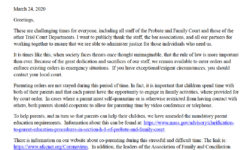About six months after the first cases of coronavirus became known in the United States, school administrators, the federal government, and local communities are considering whether children should go back to school this fall and what this might look like. Many families are being given the option to have their children participate in virtual learning. Some schools are letting parents make the difficult decision of whether to return to a more traditional school environment or to take on a bigger role in their children’s education. Regardless of which option you and your ex-spouse choose, it is important that you have a concrete plan in place, good communication, and a solid backup plan if things change.
Massachusetts & Child Custody Issues
One of the aspects where these issues are most prominent is in cases involving blended families. After the coronavirus took hold over the nation, child custody issues in Massachusetts and all over the country arose. With legal custody issues undoubtedly on the rise as “parents debate how to manage their children’s care” and a sick child being seen as a potential source of transmission, divorcing parents have had to make difficult decisions.
Meanwhile, local courts and lawyers in Massachusetts have scrambled to provide and follow guidelines on how to handle these unprecedented times. In most cases, these legal professionals recommended that parents work together to come up with a plan that worked for their family. If this was not possible, parents may have used the mediation process to form a new agreement with some help from a neutral third party. As a last resort, parents sought to modify their existing child custody order to account for the new situation.
As parents consider the next phase, they can still utilize these options. Generally, your existing court order remains in place and is effective until the order is modified. Parents who are just getting to the stage of getting a court order in place may have even more incentive to work together to create a solid parenting plan that account for the changes brought on by COVID-19, such as unemployment, school closures, sickness in the family, and other concerns. As always, communication is key.
Massachusetts School Issues
Other concerns regarding this fall is whether children will go back to school and how they will return in the wake of an increased number of COVID-19 cases. Massachusetts is taking similar action and allowing their schools to open 10 days later in order to make necessary precautions for schools amid the pandemic. However, schools must be opened no later than Sept. 16.
Many communities are currently phasing students back to schools, but not necessarily physically. In Massachusetts, some of the options available for the return to school and some issues to consider for each.
In-Person Schooling
In guidance (updated July 23, 2020) from the Centers for Disease Control and Prevention, the agency highlights the importance of schools reopening this fall while minimizing the role that children play in transmitting the disease in areas “where community transmission is low.” The CDC suggests school administrators keep students in cohorts or pods to reduce the risk of transmission.
However, some believe that the CDC was under pressure from the White House to make these recommendations. Other health experts have compiled guidance to schools for reopening, emphasizing such things as that schools cannot be opened in a safe manner for in-person instruction if the virus is not contained within the community and that the decision to open schools should be made locally, based on the latest research and scientific data.
In light of these concerns and that the CDC says that schools may consider closing again if there is “substantial, uncontrolled transmission,” plans for virtual learning should be in place in case the school closes.
Additionally, parents and teachers may need to talk to students about ways to curtail the spread of the virus, such as:
- Wearing masks
- Socially distancing
- Washing their hands
Massachusetts began asking schools for their reopening plans in June 2020. Schools that provide for in-person learning will need to implement certain guidelines, including:
- Requiring all faculty and students from second grade and up to wear masks or face coverings
- Requiring everyone to maintain physical distance
- Placing desks at least three feet apart from each other
- Training bus drivers on symptoms of COVID-19 and instructing them to refuse pickup if symptoms are present
- Designating an isolated place separate from the nurse’s office where symptomatic children can wait to be picked up
If a student in an elementary school classroom tests positive, other students in the group should self-isolate and get a coronavirus test or self-isolate for 14 days. Remote learning must be available for any student who must stay home.
Further guidelines from the Massachusetts Department of Education can be found here.
Virtual Learning
Despite the CDC’s recommendation that schools reopen for in-person instruction, many of the largest school districts in the country are instead opting for virtual learning. Many parents are concerned about their child getting sick while in an environment with many other people after months of self-quarantining. With COVID-19 rates higher than they were when schools started closing in the spring, many schools are offering virtual learning options for all students or those who want them.
Massachusetts follows these national trends. The Massachusetts Teachers Association is pushing for more virtual learning due to health and safety concerns surrounding physical instruction with some saying they will use the extra 10 days before the school year begins to redesign learning. Of course, virtual learning can prove very difficult for divorcing spouses who are not only working full time, but also managing the emotional turmoil of a divorce.
Hybrid Option
Many schools are offering a hybrid option in which students go to school for a limited number of days a week while participating in digital learning for the remainder of the time. This approach is intended to minimize risk by reducing the number of students who are in schools each day, making social distancing more possible. If your child's school plans to implement a hybrid option, again, it is important that you maintain communication with your co-parent in order to be prepared with a backup plan in case transmission occurs. You and your co-parent should have a plan as to how you will respond, such as how you may structure your child's learning completely virtually for a limited time, along with sharing custody.
Making the Decision on Educational Structure with Your Co-Parent
If you are given the option of how your child will be taught in the fall, you and your co-parent must carefully consider the potential effects on your child’s health, safety, and education for each option. Work together with your co-parent to determine what is the best plan for your particular child and your particular family. The CDC provides a helpful decision-making tool to help you determine which educational option is right for your family.
If you and your co-parent reach the decision to reintegrate your child into the traditional school environment, be sure that you have a plan in place in case your child gets ill or school closes.
Making Work and School Work While Co-Parenting
In the coming months, many homes may be serving double duty as a work-from-home jobsite, as well as a home school. Here are some tips to make this new structure work:
Set Up Separate Spaces
It is important that adults and children have their own spaces to complete their work. Even if there are not extra rooms in a house for a home office or home schooling room, you may be able to carve out some extra space by using a closet or even a wall as a homeschool command center. This can help you stay organized and keep your responsibilities separate.
Set Up a Routine and Keep it Consistent
Setting up a routine and structure with your co-parent that is consistent across your households is an effective method of creating order in an environment that can very easily spin out of control. Again, communication is essential here- discussing what works for your children with your co-parent is key. One benefit of virtual learning is that it is often flexible, and you are not tied to the traditional 8-3 school day. You can take a long break for lunch or some time to go outside and play. If you need seven days a week and fewer hours a day to meet all educational goals, you can often be flexible with your child’s online schedule. However, establish expected deadlines with your co-parent, so that house rules are consistent - these should be expectations for when your child's work should be completed as well as processes to check your child’s work, so that nothing is falling between the cracks if you are sharing custody.
Conclusion
During this unprecedented time, there are no easy answers. What is right for one family may not be right for another. It is important to carefully think through all options and consider creative solutions.
The COVID-19 situation continues to cause major disruptions and may impact your family law or divorce case. We can help explain your rights and options moving forward.
Julia Rodgers is an attorney and the firm's Business Director. You can read her full bio here: Julia Rodgers' Bio
To speak with a lawyer about a prenuptial agreement, contact Mavrides Law in Boston, MA. To schedule an in-depth initial consultation, call 617-723-9900 or contact the firm at info@mavrideslaw.com
All content provided on this blog is for informational purposes only. You should not act upon any such information without first seeking qualified professional counsel on your specific matter. Mavrides Law makes no representations as to the accuracy or completeness of any information on this site. Mavrides Law will not be liable for any errors or omissions in this information nor for the availability of this information. These terms and conditions of use are subject to change at any time and without notice. Communication of information by, in, to or through this Website and your receipt or use of it (1) is not provided in the course of and does not create or constitute an attorney-client relationship, (2) is not intended as a solicitation, (3) is not intended to convey or constitute legal advice, and (4) is not a substitute for obtaining legal advice from a qualified attorney.






